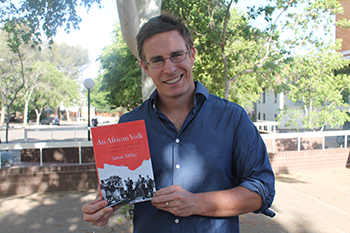Latest News Archive
Please select Category, Year, and then Month to display items
06 November 2023
|
Story MBALI MABOEA
|
Photo SUPPLIED
 The Department of Geography on the UFS Qwaqwa Campus recently played host to the Society of South African Geographers Conference (SSAG 2023), which gathered more than 100 students over three days.
The Department of Geography on the UFS Qwaqwa Campus recently played host to the Society of South African Geographers Conference (SSAG 2023), which gathered more than 100 students over three days.
Fostering academic growth, collaboration, and inspiration among students and researchers in the field of geography, the Department of Geography on the UFS Qwaqwa Campus recently played host to the Society of South African Geographers Conference (SSAG 2023), which gathered more than 100 students over three days.
Following a five-year hiatus, the three-day conference comprised student proposal presentations in different fields: human geography, environment geography, geoinformatics, and physical geography, divided into breakaway sessions over two days. Furthermore, day three of the annual conference included an excursion to the Basotho Cultural Village and Clarens.
The three-day annual student conference focused on different themes presented by two main speakers. The topic of the first keynote speaker, Dr Mahlomola Daemane, General Manager of the SANParks Arid Research Unit, focused on the contemporary conservation, transition, and relevance of science in policy and decision making.
The second keynote speaker was Dr Felicia Akinyemi, a Marie Sklodowska-Curie Research Fellow affiliated with the Institute of Geography at the University of Bern in Switzerland. Her work focuses on the intersection of geoinformatics, global change, and sustainability. Dr Akinyemi focused her talk on the integrative geospatial methods and metrics for sustainable land use. She introduced different techniques and metrics and gave students insight in early-career African research.
Speaking about the success of the conference, Nthebohiseng Sekhele, Geography Lecturer on the Qwaqwa Campus and chair of the organising committee, said, “The local organising committee was also very impressed with the quality of presentations from our postgraduate students in Geography, as well as the robust discussions that happened during the parallel sessions in the two days of the conference. We had a positive response of physical and online participation from many universities across South Africa. We are pleased that we have achieved our goal with this conference, which is to inspire the next generation of geographers.”
US author launches book at UFS on African volk
2016-10-17

Dr Jamie Miller, Postdoctoral Fellow at the
University of Pittsburgh and author of
An African Volk: The Apartheid Regime
and Its Search for Survival.
Photo: Rulanzen Martin
“I realised the importance of not just accessing the policies and political approaches of the leaders of the apartheid regime, but understanding the ideas and world views that informed them. Part of the solution to this was to learn Afrikaans.”
This is according to Dr Jamie Miller, a Postdoctoral Fellow at the University of Pittsburgh, on how he went about getting inside the mind of South Africa’s apartheid regime in order to complete his book, An African Volk: The Apartheid Regime and Its Search for Survival.
The book was launched on 11 October 2016 by the Archive for Contemporary Affairs at the University of the Free State on the Bloemfontein Campus.
Volk refers to the Afrikaner nationalist movement
The book is an ambitious new international history of 1970s apartheid South Africa. It is based on newly declassified documents and oral histories, the majority in Afrikaans, which focus on the regime’s attempts to turn the new political climate to its advantage.
The term volk refers to the Afrikaner nationalist movement, also known as Afrikanerdom. The story of Afrikaner nationalism was the medium through which the regime gained power.
Four main messages from the book
Dr Miller says there are four main messages for his readers. Firstly, the apartheid regime looked to contest and hijack new ideas and norms that formed the postcolonial world, and secondly, that we need to start thinking more seriously about the Cold War in terms of domestic politics, not just geopolitics.
Thirdly, South Africa should be integrated into histories of the global South, and lastly, we should conceptualise the apartheid regime by looking at it not just as an imperial holdover, but also by looking at what was happening in the world in the time period in question.